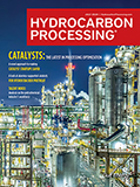Pennsylvania pipeline fight could upend international oil flows

Photo courtesy of Reuters.
New York (Reuters)—Refiners from the US Midwest are fighting for access to a vital Pennsylvania pipeline in a move that could cripple their East Coast competitors and redraw the map for international flows of crude and fuel into coveted coastal markets.
The regulatory dispute centers on a proposal by pipeline operator Buckeye Partners to that state's Public Utilities Commission. The plan would reverse the flow of fuels on a section of Buckeye’s 350-mi Laurel Pipeline, which now flows from the East Coast to Pittsburgh, Pennsylvania.
Because pipelines only flow in one direction, the change would effectively block five East Coast refineries from serving Pittsburgh, with Midwest refiners picking up their market share.
The commission will decide on whether to allow Buckeye to reverse the flow from Pittsburgh, near the state’s western border, to Altoona, a small city about a 100 mi to the east.
Raising the stakes. Initially, such a reversal would cost East Coast refiners about $10 MM/yr, according to a study that gasoline marketer Gulf Operating commissioned to include in its objections to the Buckeye proposal. Piping gasoline to Pittsburgh yields some of their highest per-barrel profits.
However, opponents including East Coast refiners and some state lawmakers are far more worried that such a decision would presage a reversal of the entire pipeline. That would take Midwest fuels all the way to Philadelphia on the state's eastern border, where it connects to distribution networks serving the entire eastern seaboard.
For Buckeye, the move represents a bet that surging Midwest refiners will be better customers—keeping its pipeline full to capacity—than their struggling East Coast counterparts.
The stakes are much higher for the refiners involved. Midwest refiners could gain a huge market opportunity to pipe fuels into the East Coast, the largest US gasoline market.
Their products could also make their way to the New York Harbor, a major gasoline trading hub, where they would likely displace imports from Europe that presently account for about 23% of the fuel consumed in the region.
Buckeye’s proposal has also drawn formal objections from state lawmakers and two refiners from the Philadelphia region, Philadelphia Energy Solutions (PES) and Monroe Energy, a subsidiary of Delta Airlines. Together, they employ about 1,000 people.
The two other firms operating East Coast refineries—PBF Energy and Phillips 66—also own Midwest refineries, giving them conflicting economic interests in the outcome.
Monroe argued that approving Buckeye’s plan would require East Coast refiners to “reduce output or sell petroleum products at drastically reduced prices” into an already oversupplied market.
Survival struggle. East Coast refiners have already closed plants because of their precarious competitive position. The region's refineries meet about one-fifth of gasoline demand on the East Coast, according to the US Energy Information Administration (EIA). The rest comes from Gulf Coast refiners, via the Colonial and Plantation pipelines, and imports from Europe and Canada.
Pittsburgh can access fuels from either the Midwest—through other pipelines owned by Buckeye—or the East Coast, whichever is cheaper at the time. Losing that market would be a blow to the East Coast plants, but the impact would be far more dire if Buckeye ultimately seeks to reverse the flow of the Laurel line all the way to Philadelphia.
East Coast flows to Pittsburgh have dropped from about 100 Mbpd in 2006 to about 60 Mbpd last year, Buckeye said, and Midwest shippers have committed to filling the line.
The competitive edge: Cheap Canadian crude. The market is tilting in favor of Midwest refiners mostly because they can access cheaper crude than their East Coast counterparts.
Midwest refiners, including Marathon Petroleum, Husky Energy and Phillips 66, have added nearly 500 Mbpd refining capacity in the last 10 yr, tailoring their systems to run crude out of Canada and North Dakota’s Bakken shale oil field.
Today, Midwest refiners process 80% of the crude that the US imports from Canada, according to the EIA, and crude from Western Canada can be purchased for $14/bbl less than benchmark US crude.
Midwest refiners can access Canada's crude via pipeline; East Coast refiners have to pay more to get it shipped on boats or trains. Adding to their competitive advantage, Midwest refiners will soon be able to tap Bakken crude through the nearly completed Dakota Access Pipeline.
The East Coast refiners import most of the oil they turn into gasoline and diesel from West Africa and South America, and the region must import gasoline from Europe and Canada to meet local demand.
(By Jarrett Renshaw and Jessica Resnick-Ault; editing by David Gaffen and Brian Thevenot)






Comments